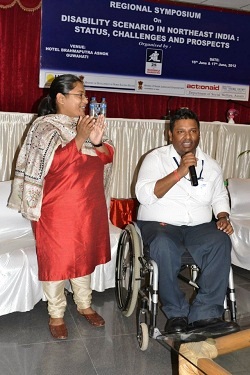Conversations, an initiative of the webzine The Thumb Print, is a laudable venture that brings together people from different walks of life onto a common platform where troublesome issues pertaining to society can be discussed in a non-formal manner. Non-formal, because Conversations seeks the freedom of an informal, living room style, non-inhibiting platform for free discussions.
I had the fortune of being invited to moderate one such last Saturday at the University of Science and Technology, Meghalaya (USTM). It is located in the picturesque hillock near the 9 mile area in Guwahati adjacent to the Regional Insitute of Science and Technology (RIST), or the Regional Institute of Science and Technology at Baridua — better known as 9th mile, Khanapara. Under the scanner was the miserable plight of regional Assamese films in the face of the onslaught of Bollywood blockbusters. Participants included actors Zerifa Wahid and Kenny Basumatary, director Rajani Basumatary (all three being a part of the newly released Assamese film, Raag), teachers, students—both from RIST and elsewhere, and a number of people from other walks of life.
In the course of the conversation what emerged was shocking revelation to all present. Whereas cultural marginalization has normally been confined to the phenomenon of colonization, it seems it can be market driven too. In this particular instance, it seems distributors based in Kolkata insisted that Gunday, a bollywood, big-budget movie, be given all shows in Anuradha Cinema or they would not give the movie to the theatre at all! As a result, Raag, which had barely completed a week, was unceremoniously elbowed out. Such arm-twisting tactics, it seems, is a common phenomenon. What shocks is the indifference of the state government to such grossly unethical practices. Governments in states like Maharashtra or West Bengal have taken special measures to ensure a specific number of screenings of their regional films. It is mandatory for theatres to comply with their directives. As a result no distributor of Bollywood movies can intimidate. The pertinent question is obvious. Why on earth can’t the government of Assam have similar statutes?
There are, of course, other issues too. The urban movie-goer represents a minimal fraction of the total aficionados of regional films. The maximum revenue comes from semi-urban or rural screenings. However, in recent years a number of cinema halls across the state have had to shut down for a plethora of reasons. This has effectively ended recovery of costs for the film-maker. Over and above this is the inability of budget-constrained regional films to compete with big budget bollywood ventures in terms of both slick productions and advance publicity. As a result, despite fine scripts, excellent music, expert direction and acting, Assamese films do not get the breathing space they deserve.
Art down the ages has depended on patronage. Be it the church in the middle ages, kings and aristocrats during the renaissance, or governments today—art necessarily needs the protection of its patrons. It is up to the government of Assam to promote the regional film industry…and this does NOT mean footing sixty percent of the bill! The arm-twisting has to be stopped. More theatres—perhaps smaller ones need to come up all over the state. Statutes need to be put in place ensuring mandatory screenings of regional films, even if only a single show per day. Such forward looking measures, Conversations felt, would go a long way in the revival of the Assamese Movie industry.
Amen to that!







































